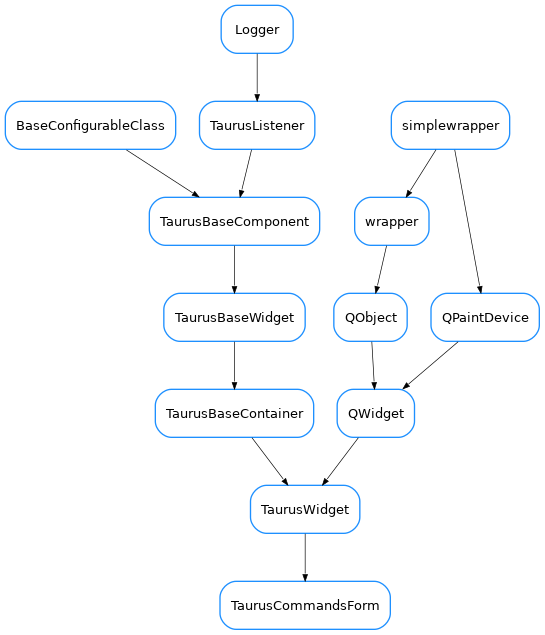TaurusCommandsForm

- class TaurusCommandsForm(parent=None, designMode=False)[source]
A form that shows commands available for a Device Server
Import from
taurus.qt.qtgui.panelas:from taurus.qt.qtgui.panel import TaurusCommandsForm
- applyConfig(configdict, **kwargs)[source]
extending
TaurusBaseWidget.applyConfig()to restore the splitter config- Parameters:
configdict (dict)
See also
TaurusBaseWidget.applyConfig(),createConfig()
- createConfig(allowUnpickable=False)[source]
extending
TaurusBaseWidget.createConfig()- Parameters:
alllowUnpickable (bool)
- Returns:
configurations (which can be loaded with
applyConfig()).- Return type:
dict<str,object>
- classmethod getQtDesignerPluginInfo()[source]
Returns pertinent information in order to be able to build a valid QtDesigner widget plugin.
The dictionary returned by this method should contain at least the following keys and values:
‘module’ : a string representing the full python module name (ex.: ‘taurus.qt.qtgui.base’)
‘icon’ : a string representing valid resource icon (ex.: ‘designer:combobox.png’)
- ‘container’a bool telling if this widget is a container widget or
not.
This default implementation returns the following dictionary:
{ 'group' : 'Taurus [Unclassified]', 'icon' : 'logos:taurus.png', 'container' : False }
- Returns:
a map with pertinent designer information
- Return type:
- getSplitter()[source]
returns the splitter that separates the command buttons area from the output area
- Returns:
- Return type:
QSplitter
- getViewFilters()[source]
returns the filters used in deciding which commands are displayed
- Returns:
a sequence of filters
- Return type:
sequence<callable>
- setDefaultParameters(params)[source]
sets the values that will appear by default in the parameters combo box, the command combo box for the command will be editable only if the first parameter is an empty string
- Parameters:
params (dict<str,list>) – { ‘cmd_name’: [‘parameters string 1’, ‘parameters string 2’ ] }
- setExpertView(expert)[source]
sets the expert view mode
- Parameters:
expert (bool) – If expert is True, commands won’t be filtered. If it is False, commands with display level Expert won’t be shown
- setSortKey(sortkey)[source]
sets the method used to sort the commands (cmd_name by default)
- Parameters:
sortkey (callable) – a function that takes a
CommandInfoas argument and returns a key to use for sorting purposes (e.g. the default sortKey islambda x:x.cmd_name)
- setViewFilters(filterlist)[source]
sets the filters to be applied when displaying the commands
- Parameters:
filterlist (sequence<callable>) – a sequence of command filters. All filters will be applied to each command to decide whether to display it or not. for a command to be plotted, the following condition must be true for all filters: bool(filter(command))==True